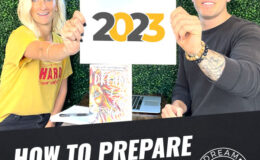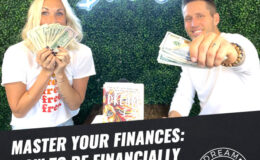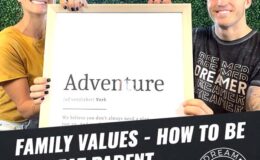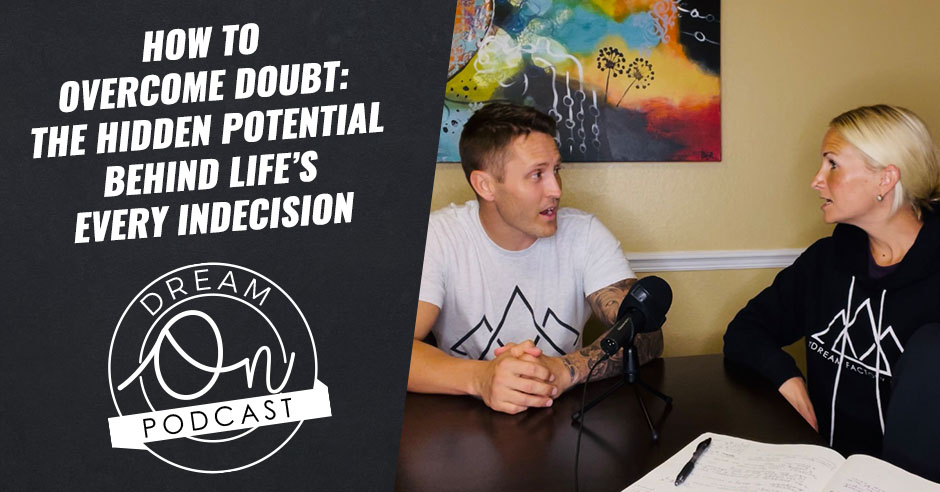
This episode is all about overcoming doubt, but before anything else, Julia and Travis Gentry would like you to do away with your every preconception of the word and approach it with a fresh set of eyes. Doubt has always gotten a bad rap, but Julia and Travis view it instead as a brimming well of potential opportunities that can come to a person’s reach once they learn how to overcome it. Citing examples from their unconventional lifestyle, the couple makes a strong case for why you should give doubt… well… the benefit of the doubt and let it potentially lead you to something great or meaningful. Listen in and get ready to confront the next doubt you encounter with a better, more positive way of seeing things.
—
Watch the episode here:
Listen to the podcast here:
How to Overcome Doubt: The Hidden Potential Behind Life’s Every Indecision
We’re going to be talking about how to overcome doubt.
This episode is sponsored and brought to you by The Dream Factory and Co. Go to TheDreamFactoryAndCo.com to learn more about everything.
I’m so glad that we have sponsors.
They’ve been amazing.
They help people get unstuck and clear about the dreams that are in them.
The community that they’re building is amazing and the swag, shirts, the hats, the stickers.
They have a messaged marketing, that if you text Dream Now to 22999 they literally blow up your phone twice a week with the most empowering, encouraging text messages. Their owner is writing a book that’s about to be launched.
What is that book called?
It’s called Dream I Dare You. It’s designed to blow people’s minds.
It’s the complete package. Did you think about it, the 6 or 7 weeks?
Same price, just longer.
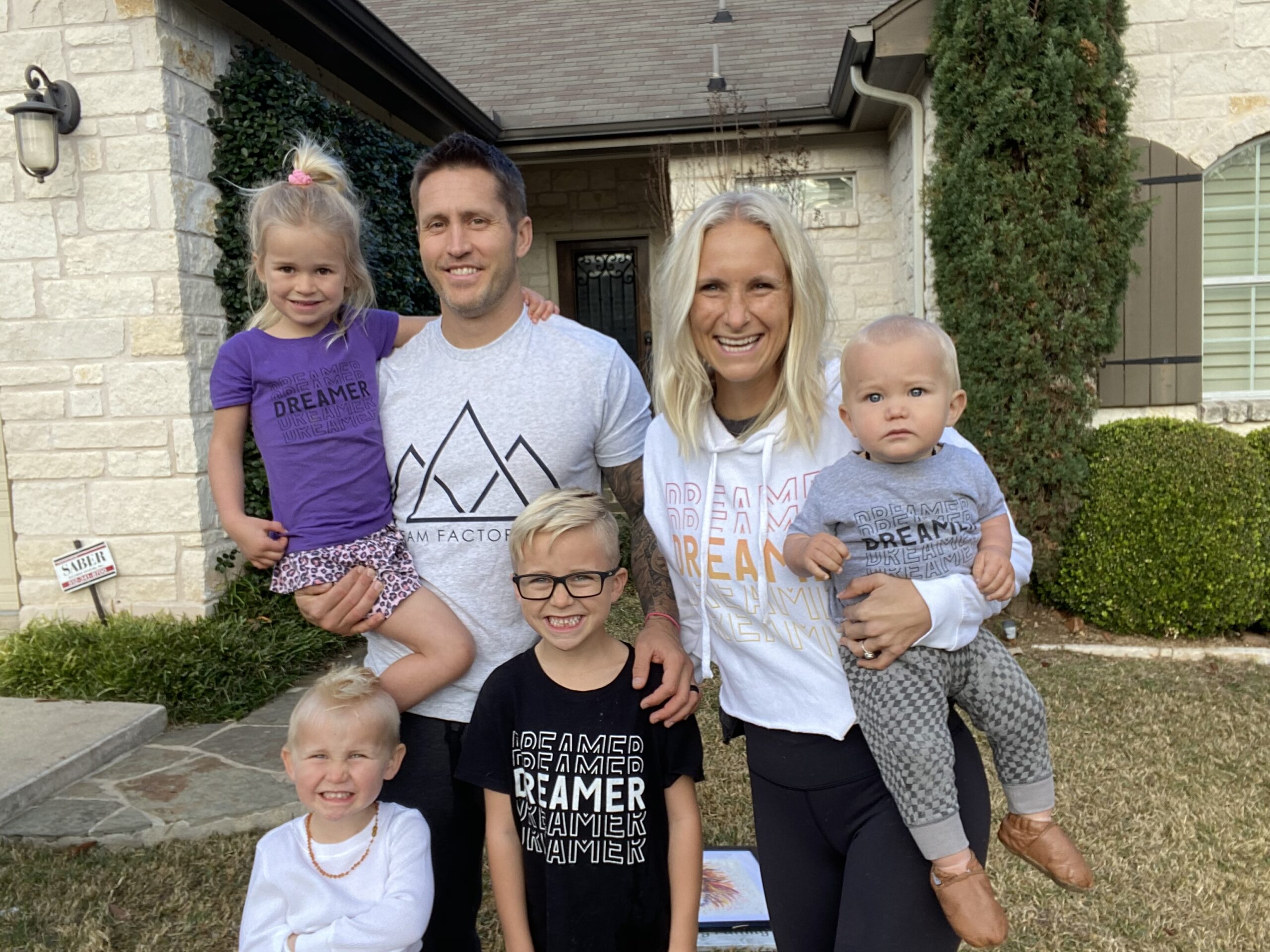
Overcoming Doubt: Doubt is an undecided belief. It’s undecided fear.
At some point it may go to eight weeks. We’ll see all the things.
Thank you for The Dream Factory And Co. We love you.
Back to our episode which is Overcoming Doubts.
Right out of the gate, I would like to be clear about what doubt is. When I have been studying this whole idea of doubt, there’s a big difference that I want to make sure that we’re clear on. There’s a difference in doubt and fear. For most people, when they think about overcoming fear. Fear is already a decided thing like, “I’m already freaking afraid. I fear something. I’m already decided. I am afraid and there’s very little that you can do to change my mind.” Doubt is an undecided belief. It’s undecided fear. I haven’t quite yet decided.
That’s deep. You need to break that down for me.
Doubt is, “I’m not totally afraid. I don’t know if I’m afraid yet.” This is why I want to make sure that people are clear about fear and doubt. Fear is, “I’m already afraid. I’m already convinced.”
“I’m going to be scared of whatever it is.”
The acronym that we all know, False Evidence Appearing Real. We believe it’s real. I fear and it’s real. Doubt, right out the gate whoever is dealing with doubt, I want to know that there’s huge potential when you doubt. Doubt means, “I’m undecided in my belief.” I want to start there because we’re not necessarily talking about fear. We’re talking about doubt and overcoming our doubt. You had even said this when we were talking about the potential titles. It alluded to this whole idea that potential to our doubt. Our doubt is signaling us of something bigger, better, that there are possibilities. It’s learning that doubt there has a huge potential.
Doubting is getting clear on, “Am I afraid? Should I be afraid? Am I excited? Should I be excited?”
That’s where we’re going to go. I hope that this is more than anything and not like this 1, 2, 3-step guide of like, “Here’s how you overcome your doubt.” No, we’re going to talk about the actual opportunity that our doubt is presenting us. It’s giving us more opportunity to think it is.
Let’s give a couple of potential scenarios. What are people facing right now? What will we face in the past? Let’s start with the one that’s pretty easy and obvious, a job. I’m going, “I don’t like my job. I want to switch my job,” or “I have an okay job. I get paid well but I don’t feel called to this. I want to do something else. I got fired from my job.”
Doubt is different than fear. Fear is decided in its belief. Doubt is undecided belief. Share on XWe consider everything that we talked about. We think about our dreams, the thing that we want to be doing, the thing that’s most important to us. We’ll call it relationships, more connection in our relationships. You’re taking our marriage to the next level. People as of late especially after COVID are like, “I miss my people. I want a better community.” I even look back and I was like, “Maybe the community I had before wasn’t as strong as it could have been. Now that I’ve been far away from people but I don’t know how to do that.” There’s room for doubt there.
Should I live here or should I not live here? Should I live in this state or that state? Should I travel on an RV or should I not travel on an RV?
Should we live in Phoenix or Austin or Florida? That’s a huge part of our journey now, which is, “Where do you want to have a home base?” It starts with interesting high-level questions like, “Where do we want our home base to be? What would the life of my dreams look like? How could I enhance my relationships? How could I lose weight?” We ask these big questions and then immediately what happens is when you shift into the doubt zone.
It’s not even bad. All the examples that we gave, it could be okay.
What happens for most people that aren’t conscious about it, doubt has a negative connotation to it, as opposed to a potential opportunity as what we’re going to talk about now. Even for you and I, here we are again on an adventure, which most people watching may go, “They’re traveling full-time.” For you and I, we knew that this is also a huge piece to finding our home base. I’ve lived in 27 homes in 34 years. Ever since you and I have been married. We haven’t lived in a place longer than two years. Everything else was under a year and under. Even before that since you graduated and moved out from your family, you’ve not lived in a place longer than a year, either.
A home base for us, though that sounds awesome and “normal people” do that, this is a big step for us to figure out where we want to have a home base. What happens is, for most people, you set out to go find that answer like, “What would I do for a business? What do I want with a home base? How do I strengthen this relationship?” We start to step out to find the answers to those questions and then immediately, we’re greeted at the door of our lives with doubt.
Mr. Doubt comes knocking on the door, for sure. Mr. Doubter, welcome to our life.
Donnie Doubter comes to the door and he gets a bad rap because he comes asking and clarifying questions like, “What if it doesn’t work? What if it fails? What if what’s happened in the past happens before? What if you can’t depend on people? What if you can’t depend on yourself? What if you make the wrong choice?” All of a sudden, by the time Donnie gets down to question number ten, you’re like, “Maybe he’s right.”
It could even come from family doubters or friend doubters. It also comes in people that love you the most sometimes. They ask questions, not necessarily trying to throw you off but then it plants the seed and that’s when Mr. Doubter comes and starts to manifest that. You start to think of all the things, what-ifs and all the possibilities of it not happening or mistakes and fear. All the things start to manifest itself. Let’s give a little bit more context because that’s real and raw to us right now. Us traveling is one. We love to travel. I love adventure. I love seeing new things, meeting new people, culturally, food, everything. The other side of this is being intentional of like, “Let’s travel and figure out where we want to have a home base. We like warm water. We like warm weather. We like the ocean. We like the mountains.” For us, it’s like, “It’s all okay. First-world problems.” We’re on this journey to, “Where do we want to live right now?” Not when we’re 65 when we retire. We’re making that conscious choice to pattern interrupt, disrupt our life, to go and seek out where we truly want but all the doubts come into play.
If I’m being totally candid, I am surprised by our levels of doubt. If I back up a couple of years when we first started traveling the country in RV full-time in the A-Class, we saw things at a rapid pace. We were in and out within 3 to 5 days, depending on where we were at. We went all over more of the Southwest part of the United States. To me, this was like, we were going to go hit the main cities that we were like, “Let’s go spend extended time in the areas that we love.” We spent extra time in Arizona and in Austin. Now, we’re over here in Orlando and then we’ll go over to Bradenton. We want to go like, “Let’s go immerse ourselves in the area because being somewhere for 3 to 5 days doesn’t tell you a lot.” There are pros and cons to every city in every town.
What I have been so surprised by is the levels of doubt this time around. This conversation is so powerful because it’s human nature. We’re hard on ourselves when we doubt. We feel like we’re the only ones. That’s a slippery slope in and of itself especially you and I who should feel bold and courageous in all the things. There have been days where our doubt has felt debilitating. What comes up for me is, “What if we make the wrong choice? What if we don’t like it? What if I can’t practice what I preach? What if I’m hearing the wrong voice? What if I pick a place for the wrong reasons?” The what-ifs have gotten bigger and bigger.
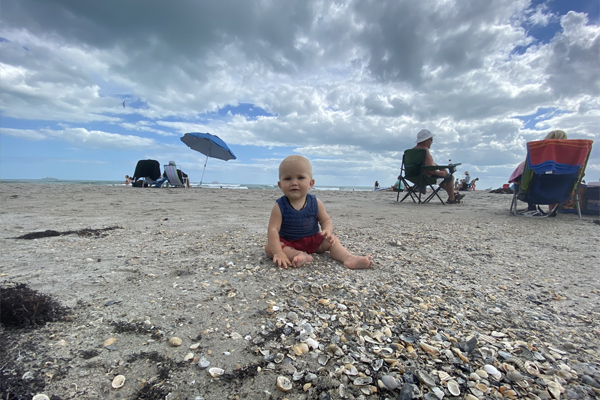
Overcoming Doubt:We shouldn’t be so hard on ourselves when we experience doubt. It’s part of the process.
Doubt is so interesting because it’s there at first, helping me recognize like, “I have not decided yet. I don’t know those answers,” which is fine. This is the beauty of potential doubt. When Donnie knocks on our door, at first, you’re like, “A huge potential here.” He’s bringing up a solid point like, “I don’t know that I know exactly what I want. I don’t know exactly what my biggest fears are or what would fail at failure look like.” He’s almost presenting clarifying questions but it’s when I start to lean into the negative side of it that my doubt turns into fear.
Now, the false evidence of the doubt is appearing real. The idea of failing now has turned into feeling like a failure. The idea of, “Maybe I won’t hear God’s voice,” has turned into like, “I don’t hear God’s voice.” Those times that I failed before, I’m taking those same behaviors with me and I’m going, “I will fail again.” Doubt is giving me an opportunity to pick a side of belief but it’s so easy to shift into fear. Once you’re in fear zone, you’re decided, “I’m a failure. I don’t hear God. I don’t know what I want. I’m going to make the wrong decision.” Now, my doubt has turned into fear. Fear is what’s paralyzing, which is why the Bible says countless times, “Fear not, for I am with you.” God is specific on why we shouldn’t fear because it’s the point of collateral damage but there’s an opportunity with doubt.
There’s so much there to unpack as far as if we’re talking about how to overcome that because we’re in the midst of specifically that. As we process this, we’re looking at unpacking each one of those. It’s multi-pronged, it’s not just one doubt. It’s, “What if I make the wrong decision? What if I don’t like it here after all? Remove all of our stuff to wherever we’re going and we buy a house or rent house or whatever that looks like and then we don’t like it?” You start to unpack it. Here’s how we’re doing that. We’re looking at it piece by piece and looking at, “This is a doubt that’s coming up for me right now.” We’d look at it from like, “I hear that. Now, what is the worst case, taking it layer by layer? If we don’t like it here then what?”
If we can give an example, I feel like Donnie Doubter is knocking at our door. You’re always allowed to open the door and Donnie is going to go, “What if this doesn’t work out?” You go, “Great point.” You shut the door. Don’t let him in your home. If he comes into your home and he takes a seat on your couch, he’s going to keep going and then it turns into Mr. Freddy Fear.
Now, he invites his friends over the other doubters.
He brings all the doubters and then turns it into fear. The idea here is almost like, “If he comes to the door and it pops up, hear it then shut the door and go into your point and then what?” Let’s look at this for what it is and not make it bigger than it needs to be. Doubt, what if the things that I am doubting are just an opportunity to get curious about my real answer?
Through this process, you also will discover what you thought you wanted is not what you want, which is part of it. That’s the doubt of like, “I made a mistake. I didn’t make a mistake. It was very clear that I made this decision. Now, I got new information and it’s not the right decision.”
We are stinking hard on ourselves as people. We’re hard on ourselves that we expect some level of perfection. I don’t even feel that we’re giving ourselves the grace to go like, “This is part of the process.” The minute that we start to hold ourselves to this standard, it’s almost like, “There is a God and we must be it. Therefore, we made the wrong choice. Now, I’m a failure.” God is bigger than any failure. He’s the one who’s coordinating this whole thing. We can plan our steps but he’s going to direct our steps all day long. We make a plan. He directs our steps. We start to think that we are above him. Our doubt needs to be listened to or paid more attention to than the God who’s leading us.
Through this process, we can elaborate on let’s say friends and family give you input. They speak in which plants the seed of doubt. It’s just information. The information could be good but maybe that information is good for them but not for you. You’ve got to be careful of who you’re taking specifically from. You have the enemy that plants seeds of doubt and then you have people that plant the seeds of doubt. You then have your own interpretation of those. When you get friends and family and they bring up things that are challenging to you and that plants the seed of doubt and they say, “I wouldn’t do that.” You’re like, “That’s great. I totally understand.” This is important because of the fact that many people are willing to give you advice. That advice could be good for them but not for you.
If you say like, “Listen to your words,” I wouldn’t do that if I was you. It’s like, “You’re not me.” It’s good. It could be bad for them. Most people would even say like, “I could never travel full-time.” We look at them and go, “Please don’t.” It’s not for you. It’s not for everybody. Even in our show, I’ve been thinking about this so much in the episode of The Walk Of Faith To Greater Things because it’s been one of our most downloaded episodes. When you start to walk out in faith, you take a step. Faith is action. You’re moving in the direction of what you want most. Once you start moving, you decide. You and I knew that we were going to get on the road because we knew that it was a part of our journey. We knew we wanted to find a home base. We felt called to get back in motion again. We knew that God had our next step once we started moving. We knew that was true.
We have things that happened that I believe are asking us and now we’re going, “Do we believe?” That moments of doubt are opportunities to strengthen the original decision, to strengthen the original area of focus, to strengthen where we want to go. Where we’re going is going to require a better version of us. When questioning from our family comes hard circumstances, negative thoughts, a little pressure or tension or a couple of setbacks or failures, we look at those as though something is wrong or we didn’t do something right. We forget the mission. We forget why we stepped out in faith for the first time. We forgot that, “I want to chase my dream. I want to start my own business. I want more connection to my marriage,” or whatever that thing is. It’s the doubt that starts to get in the way. Instead of it building strength, it creates fear. Instead of continuing to move forward towards the mission, I’m reverting back to where I came from.
God is bigger than failure. Share on XGoing through the process, the thoughts that are coming to my mind is like, when we were in Austin, I remember talking to someone and said, “We’re from Denver.” They were like, “I would love to live in Denver.” You were like, “Why don’t you?” That’s our mentality of like, “If you wanted it so bad, why don’t you?” A lot of people hold on to, “I would love to,” and they never flush it out. Maybe they liked the idea but they don’t want to. Just like Florida, we came down here to Florida and thought like, “Maybe we could live in Florida.” We’ve come to the conclusion this isn’t like where we want to be all the time but we could always wonder and have that doubt of where we are. It distracts you from being present too. We live somewhere and we were like, “I’ve always wanted to live there. Let’s flush it out.” The doubt comes in as far as like, “We went to Austin. We went to Phoenix again. We’re down in Florida. We’re going back to Bradenton.” We’re going on this to make sure that those doubts aren’t there so we can be present to where we’re at. Through this process, it brought up more doubts of like, “Why are we doing this?” Right now, our capacity is stretched.
He’s now looking back. Here’s what happened and what is a pivotal moment in spots of doubt. When we left, we knew that we felt called to go. We felt like we wanted to put the books in as many hands as we can. You want to do a bit of different real estate markets. We wanted to find a home base. We hit a pocket of an insane amount of doubt. Our doubt even turned into some fear. We started to look back. We started to recount all the times that we’ve made mistakes. We started looking at all the potential things that could go wrong. We started looking back. I want to incorporate this concept of liminal space.
What happens is the minute that you make a decision to go towards the desire, the goal, the dream, the mission, whatever people want to call it. You make a decision, “That’s where I want to go.” We all know the idea that the day that you plant the seed and the day that you harvest the seed are very different days. For whatever reason, on day three, we’re like, “Why the hell is this not growing? I want to be successful in business.” On day 30, “This isn’t working,” or “I want to make my marriage better.” After ten years of having a disconnected marriage, 30 days in, we have this false expectation that it should be better. What happens is we take our eye off of the price, the goal and the dream. We start listening a little bit too much to our doubt.
We started toying around to your point, we’ll bring him in the house with all the friends who come in and start hooting and hollering and asking us all these additional follow-up questions. “What if this? What if that? What about this? What if this happens? Remember the last time you did that.” All of a sudden, our brain takes over. Our brain only knows how to give us information based upon what it has experienced. It’s all about the past. It keeps me safe. It keeps me present based upon everything that’s already experienced from my past. Instead of looking at where I’m going, my walk of faith to a place that I’ve never been, never achieved it, never done it, never accomplished it, that’s in and of itself so vulnerable. It takes so much courage, boldness and willingness to keep saying yes but you start to get distracted. All of a sudden, the distraction turned into fear and now I’m looking back. Now, I want to go back to familiar. Now, I want to go back to the world that I know. Even if it’s not something that served me or wasn’t that healthy of a relationship or that healthy of life or the job I didn’t like, at least I know it.
Sometimes through this process, you get out of it what you weren’t even intending to get. It’s through the doubt but it brings new awareness, ideas and thoughts.
Let’s talk a little bit more first about this liminal space. That’s what I want to hit on before the other side of it, which is that space in between. That’s what liminal space is. It’s the space in between. I’ve let go of my past. I’ve let go of where I was. I’ve let go of habits, patterns or addiction. I’ve let go of that. It’s not serving me anymore. I’ve taken the step to go, “Great, I’m done. I’m going to move on,” yet I haven’t grabbed onto the goal. I’m not seeing the results of what I want. It’s like this great hallway of in-between. They even say this is the definition of it. It’s the ambiguity or disorientation that occurs in the middle of the rite of passage. Liminal space is from the study of societies and cultural development. This is why I think this is interesting. What starts to freak us out is that we’re in a liminal space and we didn’t even know it was a thing.
We’ve been talking about liminal space for a while.
I’m seeing most people. Remember, when we first figured out what liminal space was and it was like, “Oh, my gosh.”
I remember saying it. I was in a mastermind and I was like, “I’m in the middle space. I own it. Here’s where I’m at. I’ve let go. I’m searching for something. I haven’t grabbed on to anything yet.”
Ambiguity and disorientation, you’re like, “What the heck am I doing? You almost feel blank. You hear what people are saying. You’re trying to learn. You’re trying to observe. You’re like, “I don’t know why but I’m not even absorbing what you’re saying. You’re blowing my mind but I can’t grab on to it yet. You’re blowing my worldview on even such a small scale. You’re blowing my understanding because all my brain knows are the things that it knows.” The fact that what you’re presenting me is something that’s such a mind blown that it’s ambiguous, that I’m disoriented. That’s liminal space. This concept blew my mind. Looking back on our journey, I think that’s what happened in Austin. I don’t think that I was specific enough to call it that, that we’re just in the hallway of in between. Don’t keep listening to the doubt, rehearsing the questions, looking for all the negative and fear and confirming the biases to be true because it’s only going to shoot me back to where I came from. It’s never going to take me to where I want to be.
Maybe that was what I was getting to specifically. Austin was that for us, for sure. There was a lot of doubt.
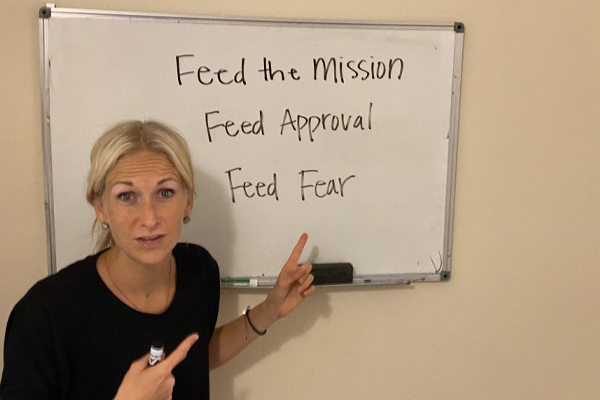
Overcoming Doubt: Doubt is not suggestive. It’s not concrete.
People are like asking, “How was Austin?” I think that was my lease.
We were like, “Let’s rent the house. Let’s buy a house.” All these things, all the doubts in it.
People, understand this. Travis went to go look at rentals when we were in Austin. The disorientation and the levels of doubt, fear and worry, I honestly don’t know that I can remember a time in the last few years that I felt like that.
That’s where I was trying to get at when you’re in this process whether you know it or not, now you do. Now, you have a name for it. You call it the liminal space. When you go from the known to the unknown whether you know it or you don’t know where you’re going, like if you have a job and you’re like, “I’m going to quit my job and I don’t know what I want to do,” or you do know what you want to do but it’s a journey to get there. You have to go back to school. You have to learn new skills. You start a business, whatever it may be. In that process specifically for us, we also stopped drinking.
Our coping mechanism was that.
Through this process, we’re getting things that we didn’t even anticipate because we looked at it and said, “Here’s what we used to do. Here’s how we use the hide and not take ownership or press into this doubt.” We invited Mr. Doubter in, Donnie and some of his friends to sit down with them to hash this out and see like, “I want to understand this at a deeper level.” Some of that doubt gets heightened when you drink, do drugs, eat food, shop, spend way more money than you have, all the things. You have to stop and look at it. Like we said, it’s a thing under the thing. This doubt is birthed but then you have something else that comes off of it and it’s not necessarily that. Like you said, it’s maybe from the past that you’re bringing into the future or something else that manifests in there but it’s not the thing.
This is why I think that doubt is huge in our lives. It’s just information knocking on your door. The minute that doubt pops up, it’s almost like if we can ask ourselves, “What do I believe? Am I going to listen to my head of the past?” All of the fear, worry and failure that could turn into this and could turn into that, it’s a downward spiral. I’m not suggesting to do checks and balance and ask all the clarifying questions. That’s not what I’m saying. I’m either going to go that way or I’m going to look ahead at what I want most and it’s an opportunity to go. All Donnie is doing out my door is asking me, “What do I believe? Do I believe in my dreams and where I’m going and what God has in waiting for me? Do I believe my fear, my worry and all the other things?” It’s asking me to pick a side. It’s wanting me to start doing push-ups, to become a stronger version of me.
As I continue my walk of faith, I’m stronger. It’s not about getting there. It’s about staying there. It’s about being a stronger version of me. Even in my book, I said this, “Your dreams aren’t trying to make a believer out of everybody else. They’re trying to make a believer out of you.” My doubt is, they’re almost preparing me to be a stronger version of me and to tell myself. Parents who maybe are even trying to be like, “Have you thought about this?” Friends are like, “I wouldn’t do that if I was you.” People in the industry are going, “The industry’s never done that.” For you to be able to speak out of your mouth in faith, I hear you and appreciate your feedback but I can’t not do this. This is something that I know I was born to do, need to do, will be good for my family. I’ve been at my job long enough. It’s my time. I told myself that this year I was going to chase the things that are most important to me. That moment is waiting for you to share with you and the rest of the world, “No, I believe.” Again, the Bible talks about like, “He who waves is being taught to and fro on the ocean.” The reason that we’ve talked to him and fro is because we’re going, “Do I believe? Do I not believe?”
Through that process, it’s allowing you to let go of certain habits and patterns and pick up new ones and new awareness.
Thank you, all you readers. We’re doing therapy and this is partly why I was trying to do this episode so we could talk this out. In moments of doubt, it’s asking me, “Do I believe? What do I believe?” It’s there not to break me. It’s there to make me. When I realized that this is an opportunity to decide what do I believe that all my doubt is asking me. It’s not saying, “You can’t do this.” It’s asking me, “Do you think you can do this?” It’s not saying you should be afraid. It’s asking, “Are you afraid?” It’s not saying you’re going to fail. It’s, “What if you fail?” Doubt will ask you a question. Answer it in authority. Answer it based upon where you’re going, not where you’ve been. Answer it based upon what God told you, the dream, the vision, the goal, answer it based upon that, not based upon the fear. Do you see what I’m saying?
Yes. You brought yourself to where you’re at. There again, I hear what you’re saying and you have to then let go of something and add something new. I have to be equipped with new information. If I want to start a business, I’ve never started a business, I need to then be equipped. It’s exciting and then there’s a lot of doubt. I need to let go of some of the things in the past but more so, I need to equip myself with new thoughts, patterns, habits and information.
Your dreams aren’t trying to make a believer out of everyone else. They’re trying to make a believer out of you. Share on XThat’s the power of liminal space. Once you decide that now I believe, “I believe I’m going to start a business,” the brain may go, “How do you do that?” Let’s be honest, “I don’t know yet.” Even for our situation, which is, “Where are you going to live?” “We don’t know yet.” “What don’t we know?” “We don’t have enough information.” We’re not wrong. We’re not going to fail. We don’t have enough information. Now, it goes, we have our work cut out. We’ve got to figure out more information. We need to figure out what the next step is. To your point, the reason that liminal space is such a slippery slope is in those moments and I had a few of them in Austin, which has been surprising in our journey of sobriety. It’s not as bad, it’s hard for me personally, as I would have thought, except when we were in Austin.
Those moments, for whatever reason, felt easier to go back in and to check out. It felt like it was easier to go back and check out. What you’re alluding to is that at that moment, I needed to fill it with something new. If I take something out of my life then I needed to fill it with something new, as opposed to being empty. Talk to me about, in your opinion, what does that process looks like for you? If you’re taking something out, maybe give an example or something that you’ve seen in your life or the difference between being in Austin and now being here. What was the thing that was taken out and what did you fill it with?
For our process, it’s been, we’re going to travel. We don’t have an end in sight. We’re just going to go. We want to go to these places to see if those are places that we want to settle down through. Be careful what you asked for. We’re not being stretched. We haven’t had our capacity. Not only did we leave and traveling with four kids, trying to homeschool, finding a new nanny and we love working out, finding a gym and then an office and then me pressing into real estate and having two people work with me, figuring out exactly the business model, not in one market but a couple of markets and then you’re doing all the things, it was like, we hit our capacity in a few different areas very quickly. You look at it like, “What’s important to me now?” Travel was important to me. Now, it’s not as important because my priorities have shifted.
That awareness of like, “We set out to do this and now we’re going to adjust it.” The doubts in Austin of understanding like, “These are real. Where I want to go? What do I need to let go of? Stop drinking. I need to spend a little bit more time in the business, more so than I ever have.” The shift is we are finding it at home. That’s our priority now. I have something to go towards. We’re not 100% sure on where that place is but through the process of elimination, I’m not looking in those places as though, “Could we live there? Should we live there? Do we want to live there?” As we’ve gotten clear, we’re going towards for me because that’s the role that I do and love, is hunting for properties and opportunities in places that we want to. Now, I have something to go towards.
Even if you could break this down a little bit like a coping mechanism? You could say it’s like drinking. Once you let go of drinking, which is hiding, it’s a way to hide. Now, you can use the term and not trying to be ambiguous or creating any dissident orientation for people. Instead of you’re checking out, you’re hunting. There’s one thing that they say an addict of any kind goes back to their addiction, 70% to 80% of people go back, not because they want to but because they don’t fill it with anything more progressive. They go back to it because it’s what they know. They don’t fill it with something new.
When we first stopped drinking, instead of drinking every other day from 4:00 to 6:00, I would go to the gym and I would run. I would listen to something that was good for my mind and body and I would work out. From 4:00 to 6:00, I need some time to get in a different zone whether it was because it was a workday, being with the kids all day or a trip of full-time travel, I conditioned myself to go, “I need a drink.” How often? “I just need a drink. I need to check out.”
I have a client who was like, “I need a smoke break.” I was like, “What do you need?” She was like, “I just need to breathe.” I was like, “That is the best thing I’ve ever heard,” because she’s trying to stop smoking. I was like, “What you’re saying is that you want to breathe but yet you’re inhaling a cigarette?” She said, “Yes.” I said, “Are you ever getting a chance to breathe?” She was like, “No.” Like alcohol, it was, “What I need is a break but if I drink, I’m only creating more activity in my mind and my body with alcohol, which is sugar. It’s sending this rush to my body. I’m not resting. I’m not checking out. My body is engaged because of all the sugar.
Not getting clear too. It prohibits you from looking at the next step. “This is not what I want so then what do I want? I need to know the next step. Instead, I’m going to drink and circle around and not find that next step.”
The idea here with liminal space and how you do this is that you’re consciously choosing to not just let go of the thing and fear, you have to grab faith. Don’t let go of the addiction, you have to grab onto the vision and the dream. You’ve got to move it out of your life but then you have to almost double, triple down on whatever it is wherever you’re going next.
It can be such a scary place to stop doing something and start going after something that you know or not know and let it be. “I don’t know 100% but I’ve got to stop doing this and all the things that come up.” It’s almost like a weed as you’re walking. There are weeds and you pull them. If you don’t get the root out, that weed comes back. You have to understand like, “What is it?” For us, we would go back to drinking. I’ll drink because that makes me feel like I pulled that weed but tomorrow it comes back around 4:00.
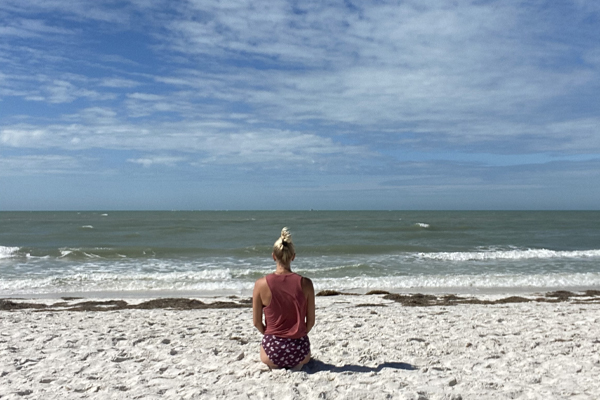
Overcoming Doubt:Doubt is actually giving you the chance to throw yourself at your dreams!
All of a sudden, you pull out those weeds and you uproot them. You’re looking at a space and it’s empty. This is what liminal space feels like to your point. If we empathize with ourselves and the people around us who are potentially going through a liminal space, it’s like emptying a room or clearing out our house. Even when we got rid of everything a couple of times, we moved this last time on before we started this journey. I looked around at this empty house. At first, you were like, “This looks amazing. It’s clean and spotless. Get rid of the habits. Get rid of the patterns. Start fresh.” If you stay in an empty house long enough, it’s so lonely and quiet. You’re a little disoriented and it doesn’t feel like home. It looks nothing like what you’re familiar with.
You put more stuff in.
No, liminal space is nothing. What we do is we go out to the dumpster. We go out back to that and we put it back in.
You fill it. Consciously, you have to be aware of what you’re filling with it. Are you filling with the stuff from the dumpster? Are you filling it with new information and thoughts?
That’s why it’s important to go like, “This is why this is a slippery slope because no wonder our doubt turns into fear.” We didn’t even know that this was a thing, first of all. It’s easy to grab onto the fear, into the worry, into the doubt and the anxiety and all the things that we’re accustomed to. It’s easy to grab onto the familiar, even though it’s not serving us. The goal to your point is with your whole self. You have to throw yourself at your vision. You have to throw yourself at the next result that you want more, convinced. I believe I’m going to dive in until I know how to do it.
As we’re saying this a few things, I know conversations that you’ve had that prohibit people from even entering in liminal space. It’s the fear of missing out, the fear of the unknown or the unknown in general, in comparison. It’s easy when we’ve talked to a couple of people as of late and it’s like, “I’m staying here because of the benefits but I’m miserable.” Again, it’s like, “If they only knew and walked through,” because that’s doubt. I doubt I’m not even going to take the next step, dream and think about what’s possible because doubt has set in, “What if I don’t have these benefits? What if I don’t have this retirement package?”
I remember talking to someone several months ago. The job is okay but they’re staying in this career for the next fifteen years. It’s the best years of their life because they’re 30-ish. They’re going to stay in it because of the benefits. If they stay another fifteen years, they get these very mediocre benefits. Especially in fifteen years, depending on appreciation, what the dollar is worth and all the things. They limit themselves of like, they can make ten times of that if that’s what they’re concerned about but doubt sets in of like, “No, I’m not going to do it because I doubt that I can’t make any more or do something better than what I have.”
Again, there’s that doubt that came and goes like, “What if I can’t find a better benefits package?” Donnie is knocking on my door, “Let’s walk this out for a second.” Donnie knocks on the door and goes, “What if you can’t find a better benefits package?” You shut the door and you go, “Is that true?” Is it more possible for me to make money elsewhere? Is there such a thing as multiple streams of income? Who do I know that is making more doing what they love?” Instead of taking that doubt and hunkering down and going, “You asked me a question,” but I’m going, “You’re right.”
Donnie is not trying to be right or wrong. He’s posing a question and asking us if we believe or not believe. He’s asking me to pick a side, “I want to know. What if you can’t find a better benefits package?” Now, I have to go, “Which way am I going to go with this?” The minute that I hunker in and go, “Donnie is right. Donnie is not trying to be right. Donnie is posing a question.” He’s asking a question. Our doubt is asking a question. That’s presenting an opportunity to prepare us for a liminal space.
Even if you can open the door of liminal space, if you can’t, the doubt sets in before you even can go into that space of like, “What is possible? What’s the one thing that I need to do next?” It’s one thing. You don’t have to have it all figured out. You don’t have to quit your job tomorrow. You don’t have to move to another state tomorrow. That one thing of like, “How do I flesh this out, get new information and realize this is something I want to pursue or do?” Another conversation, one more thing that you have to do.
That was my biggest takeaway from our show and walking in faith. Once you start down the liminal space until you grab onto the thing, until you’ve manifested the dream, until you’ve actualized in a certain area of your life and gotten the result that you decided to chase, it is one step at a time or few. You don’t get the whole thing. When you’re creating something that you’ve never created, doing something that you’ve never done, even if it’s been done by someone else, which a lot of times other people have done something similar. It’s us choosing to do it in a new way, in a new flavor, in a new time. We get the next couple of steps. I feel like Donnie is there every single time if we use it as an opportunity to do a few push-ups. If we use our questions of doubt as an opportunity to say, “What do I believe?” This is asking me to believe because my dreams need me to be a believer. My dream needs me to believe. Faith that can’t be tested can’t be trusted. If I can’t be tested, I can’t be trusted.
Doubt is not a statement. It’s a question. Share on XI think that doubt is testing us, not because we have a sick God or God who’s like, “I’m playing a weird joke on these guys.” It’s like, he needs us to be strong. He needs to know if we could be tested just like muscles. If we’re working out, the way that I’m going to build strength is by putting some pressure on it. That’s what it’s all about. As I start moving towards from where I am to where I want to be, that liminal space in between that I’m presented with doubt after doubt, question after question, all the quiet, ambiguity and disorientation is there because it’s teaching me new things in my brain. It’s creating new pathways of understanding. That’s why your brain does that because it has created all these pathways of understanding for the point of shortcuts.
We’re thinking many thoughts all the time that the brain is like, “Just go left. When someone looks at you that way, they don’t like you. Go left.” It creates these patterns like, “If you fail, that means you’re not worthy.” It’s a pathway so you can quickly understand the terminology. It’s unconsciously competent. When you start to do new activities, your brain is almost like trying to turn right and it’s never turned right before. It’s like wigging out a little bit. The more you do it, you’re creating new pathways in the brain and opening up your understanding.
Doubt is making a decision without having all the information.
You’re making a decision without having all the information, which is then why you have fear. It’s false evidence. You’re making a decision with not enough information so it’s false evidence appearing real. That’s exactly what happened.
Someone I listened to in the real estate world, he gave an example of like, “If I paid you $100,000,” his name is Pace Maury. “If I give you $100,000 to jump out of a plane, would you do it?” Most people would just be.
Without a parachute?
No, you don’t have a parachute. Would you jump out of a plane for $100,000 without a parachute?
No.
What if I told you that plane was on the ground?
That’s awesome.
It’s having all the information. You can’t make a decision if you don’t have all the information. It’s one thing, one question away from, “I don’t have a parachute.” “No.” “Where is that place?”
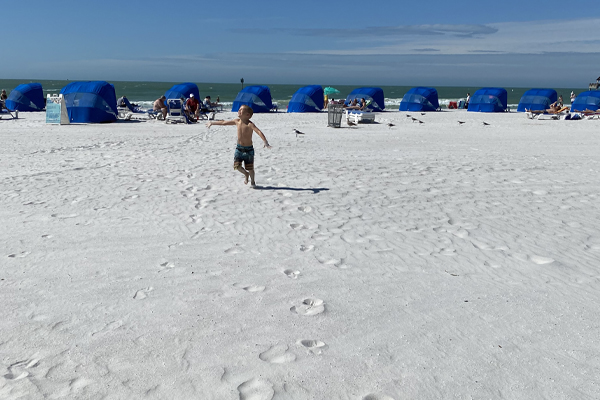
Overcoming Doubt: Doubt is revealing the fact that you don’t have all the information. Don’t shift into fear mode, just go get more information.
Donnie is asking a question, “Would you jump out of a plane without a parachute if I gave you a $100,000?” We’re like, “No, Donnie.” Let me ask some clarifying questions, “How high am I?”
He’s just asking and getting clear on that one next thing. Doubt, there again, is not having all the information in making a decision. Once you have the decision then you can make and see if it is right for you or wrong for you. I remember a family member told me that real estate, landlord, slumlord, I was like, “That’s interesting.” I thought about it and I was like, “Have they ever owned and rented real estate?” “No.” That’s probably right for you based off of the truth that you came up with and live by now but that’s not my reality. There are slumlords and there are good landlords too. You get to choose through this process but it’s having the right information, asking and seeking out. When you have doubt, if you don’t have the right thought, you need to seek out and get a new thought to see if it is the right decision or not the right decision for you.
That’s in the theory of how I would encourage people to overcome their doubts. Donnie is asking a question. He doesn’t want to be right or wrong. He has no preconceived notions. He has no interpretation of the question. He’s just asking the question. It’s simply our opportunity to go, “I don’t have enough information. Thank you for presenting the question. I need to find out what’s next. I need to get curious. I need to envision. I need to wonder. I need to do my homework a little bit.”
Most of the time, people stop at that question when they don’t know the answer.
It’s because it goes, “You’re right.” No, he’s not stating a fact. It’s a question. You need to find the truth. It’s not in bias truth, not a judgment, not in truth based upon the past. It’s a truth based upon where you’re going, the word of God, and your dream. You need to run it through your own filter. Your doubt is not a statement. It’s a question. That’s how you overcome it is that you simply go, “It’s just a question. I need to find aligned truth. I need to find the truth based upon what God’s called me to, based upon my dreams, based upon what heaven has for me, based upon my visions, based upon my goals. Now, I have the full picture.”
Overcoming doubt, will you sum that up as far as for people reading and the process that we have gone through or going through, the checks and balance of overcoming doubt?
If you consider it from a place of overcoming doubt, it’s building the opportunity to be stronger. That’s all it is. It’s just asking the question.
To be stronger, what do you mean by that?
Doubt is the symphony and opportunity to strengthen your belief. That’s what I’ll say. Doubt is an opportunity that’s asking you, “What do you believe? What if you fail?” Good question, “What if I fail? This could happen right then but I still want to do this. I want to fail a million times for the thing that I want most. That’s my answer.” “What happens if you make the wrong choice?” “Thank you for your question. What happens if I make the wrong choice? I would learn the lesson and then make the right choice and not do that again. There’s my answer.” “What happens if someone disappoints you? What if someone disappoints me?”
Again, doubt doesn’t say, “You’re going to be disappointed.” That’s fear, “I’ve already decided.” It’s the question that goes, “What if you’re going to be disappointed?” It’s probably true. I’m probably going to use be disappointed. I’m going to disappoint myself once or twice. Someone’s going to disappoint me because we’re people working. I’d rather be disappointed heading in the direction that I want to be than disappointed staying where I’m at. I guess disappointment is par for the course. Now, when disappointment happens, you’re like, “Don’t like it but it’s par for the course.” Doubt was almost like preparing you to build your belief so you can move through the liminal space because on the other side of the liminal space, it’s actualization. It’s your dream. We’re living the dream. We have to move through it. That’s the power of doubt. Thank you for that therapy session.
Thanks for reading the blog. Once again, sponsored by The Dream Factory And Co. We appreciate you guys reading. Join us next time.
Important Links:
- Dream I Dare You
- The Walk Of Faith To Greater Things – Previous episode
Love the show? Subscribe, rate, review, and share!
Join the Dream On Community today:

